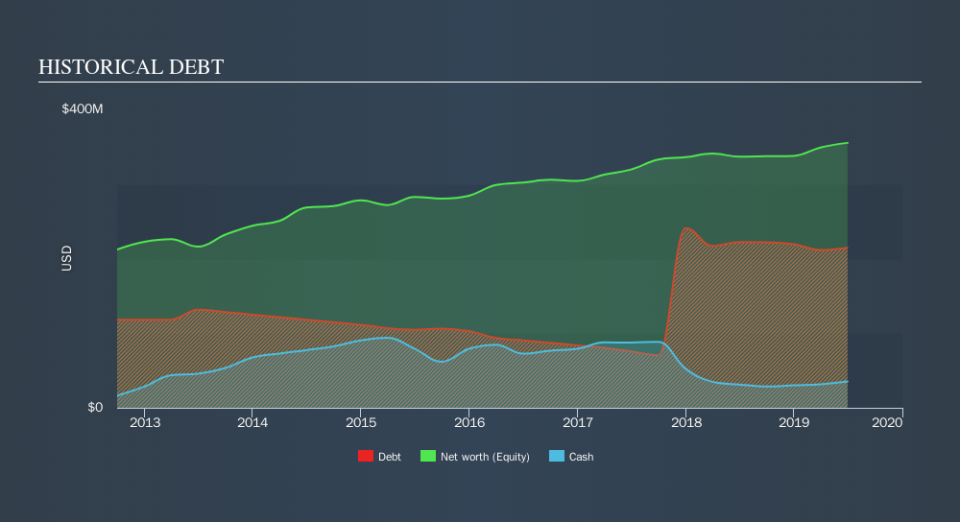Does Thermon Group Holdings (NYSE:THR) Have A Healthy Balance Sheet?

Legendary fund manager Li Lu (who Charlie Munger backed) once said, 'The biggest investment risk is not the volatility of prices, but whether you will suffer a permanent loss of capital.' It's only natural to consider a company's balance sheet when you examine how risky it is, since debt is often involved when a business collapses. As with many other companies Thermon Group Holdings, Inc. (NYSE:THR) makes use of debt. But the more important question is: how much risk is that debt creating?
Why Does Debt Bring Risk?
Debt and other liabilities become risky for a business when it cannot easily fulfill those obligations, either with free cash flow or by raising capital at an attractive price. Part and parcel of capitalism is the process of 'creative destruction' where failed businesses are mercilessly liquidated by their bankers. However, a more frequent (but still costly) occurrence is where a company must issue shares at bargain-basement prices, permanently diluting shareholders, just to shore up its balance sheet. Of course, plenty of companies use debt to fund growth, without any negative consequences. When we think about a company's use of debt, we first look at cash and debt together.
View our latest analysis for Thermon Group Holdings
What Is Thermon Group Holdings's Debt?
The chart below, which you can click on for greater detail, shows that Thermon Group Holdings had US$214.4m in debt in June 2019; about the same as the year before. However, because it has a cash reserve of US$35.3m, its net debt is less, at about US$179.2m.
A Look At Thermon Group Holdings's Liabilities
According to the last reported balance sheet, Thermon Group Holdings had liabilities of US$69.9m due within 12 months, and liabilities of US$246.1m due beyond 12 months. Offsetting these obligations, it had cash of US$35.3m as well as receivables valued at US$127.1m due within 12 months. So its liabilities outweigh the sum of its cash and (near-term) receivables by US$153.7m.
Of course, Thermon Group Holdings has a market capitalization of US$794.3m, so these liabilities are probably manageable. However, we do think it is worth keeping an eye on its balance sheet strength, as it may change over time.
We measure a company's debt load relative to its earnings power by looking at its net debt divided by its earnings before interest, tax, depreciation, and amortization (EBITDA) and by calculating how easily its earnings before interest and tax (EBIT) cover its interest expense (interest cover). This way, we consider both the absolute quantum of the debt, as well as the interest rates paid on it.
Thermon Group Holdings's net debt is sitting at a very reasonable 2.4 times its EBITDA, while its EBIT covered its interest expense just 2.9 times last year. While that doesn't worry us too much, it does suggest the interest payments are somewhat of a burden. We saw Thermon Group Holdings grow its EBIT by 4.0% in the last twelve months. Whilst that hardly knocks our socks off it is a positive when it comes to debt. When analysing debt levels, the balance sheet is the obvious place to start. But it is future earnings, more than anything, that will determine Thermon Group Holdings's ability to maintain a healthy balance sheet going forward. So if you're focused on the future you can check out this free report showing analyst profit forecasts.
Finally, a business needs free cash flow to pay off debt; accounting profits just don't cut it. So we clearly need to look at whether that EBIT is leading to corresponding free cash flow. During the last three years, Thermon Group Holdings produced sturdy free cash flow equating to 50% of its EBIT, about what we'd expect. This free cash flow puts the company in a good position to pay down debt, when appropriate.
Our View
Thermon Group Holdings's interest cover was a real negative on this analysis, although the other factors we considered were considerably better In particular, we thought its conversion of EBIT to free cash flow was a positive. When we consider all the factors mentioned above, we do feel a bit cautious about Thermon Group Holdings's use of debt. While debt does have its upside in higher potential returns, we think shareholders should definitely consider how debt levels might make the stock more risky. Of course, we wouldn't say no to the extra confidence that we'd gain if we knew that Thermon Group Holdings insiders have been buying shares: if you're on the same wavelength, you can find out if insiders are buying by clicking this link.
If you're interested in investing in businesses that can grow profits without the burden of debt, then check out this free list of growing businesses that have net cash on the balance sheet.
We aim to bring you long-term focused research analysis driven by fundamental data. Note that our analysis may not factor in the latest price-sensitive company announcements or qualitative material.
If you spot an error that warrants correction, please contact the editor at editorial-team@simplywallst.com. This article by Simply Wall St is general in nature. It does not constitute a recommendation to buy or sell any stock, and does not take account of your objectives, or your financial situation. Simply Wall St has no position in the stocks mentioned. Thank you for reading.

